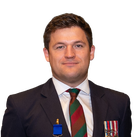Harry’s military claims point to one thing – an enduring sense of trauma
As some veterans form a line to take potshots at Prince Harry, his latest endeavour seems another layer in his processing of the quite extreme unresolved grief of his childhood

Prince Harry is publicly processing the trauma from his past and his actions speak to the challenges that veterans up and down the country experience.
As some veterans form a line to take potshots at Harry, his latest endeavour seems to me another layer in his processing of the quite extreme unresolved grief of his childhood.
Claims to have killed 25 Taliban, whatever their truth, are both unwise but also counter the unspoken code of the UK armed forces. The cynic in me suspects that the book’s editors wanted something salacious. But Harry should have refused.
There is an unwritten rule that such things are never openly discussed. I have been asked by children and naive adults, often with a lack of understanding, “how many people have you killed?” They seem somewhat disappointed when I refuse to be drawn on the question. And perhaps more excited when they interpret silence as an affirmation. It is neither.
Ask anyone sensible in the military about “kill counts”, and they will tell you it is something reserved for computer games and Top Gun. The taking of life is so serious, especially within a military context, that it is not something that is bragged about or publicised.
Discussing kill counts openly often suggests that someone is processing a large amount of trauma linked to their service and possibly before it. The trauma that many veterans process is not only linked to wars such as Afghanistan and Iraq. Experiences before joining the services go just as much to inform a veteran’s mental state as their time in service.
Harry has Adverse Childhood Experiences (ACES). In my work with young people in custody, with our 3Pillars Project Charity, none of whom shared the advantages that Harry has, we refer to ACES in open terms. Parental drug and alcohol addiction, abuse, neglect – and, significantly, the loss of a parent – all constitute trauma and adverse experience in childhood.
Accumulate a number of these and you will start to witness it played out in adult life; through drug taking, violence, irresponsible sexual behaviour and, subsequently, a possible predisposition of PTSD.
For many veterans, this is not played out on the world stage in Oprah interviews, Netflix and book deals, but we see the consequences of their trauma in homelessness, alcoholism and family breakdown.
Unresolved grief amongst service personnel is often masked by their sense of belonging to the services. The military acts as a de facto family, which creates a sense of grief as that is lost when people leave the service.
While I can not speak for all veterans, I feel hope was placed on Harry to be a pioneer for Veteran Affairs. This is a wasted opportunity on all sides. His Invictus Games project has had a significant impact, but there is still more to do which would lie at the heart of servant leadership. It is unsexy, repetitive work of photo ops and handshaking, but to those most in need, it is profound.
Instead, I cannot help but feel that the UK is subject to potshots from across the Atlantic, some of which go to the core of the British psyche. Increasingly it seems that Harry is cutting off the possibility for reconciliation with his family and that is actually where the true sadness lies.
Despite the misjudged oversharing of his service, veterans still need to stand by Harry and offer him support when he needs it in future. Lets get beyond the hysteria of what is in fact just a very sad tale.
Beyond Harry, this episode should be a call for all veterans everywhere to reach out and check in with those they served with. We all carry trauma in different ways and a kind ear and forgiveness is sometimes what people need most.
Mike Crofts is a former British Army Captain who served two tours of Afghanistan. He is is now the CEO of human performance company Amodigo and the founder of criminal justice charity 3Pillars Project
Join our commenting forum
Join thought-provoking conversations, follow other Independent readers and see their replies
Comments
Bookmark popover
Removed from bookmarks